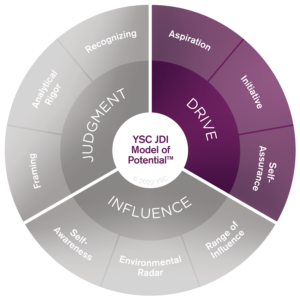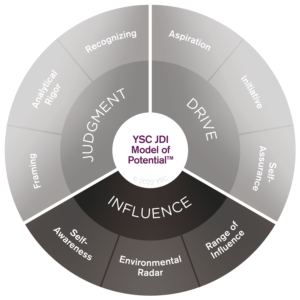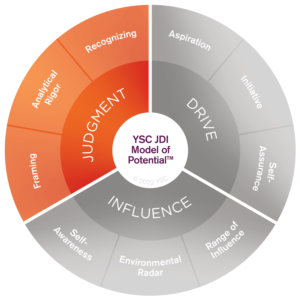During this time of crisis, our normal patterns of working have radically changed. Many of us will need to think of ways to keep ourselves productive, motivated and to build our capability during the outbreak of coronavirus. Read some tips pulled from the JDI Development Guide that might be useful for individuals and leaders during this time of flux.
Judgement
![]()
Use this time of significant change to increase or update your expertise in your industry. Where possible, seek to understand risks and opportunities relating to the crisis, to inform your decision making.
Read about your area to spot new opportunities. Digesting papers, journals and articles relevant to a market and/or industry sector help us to identify changing trends. Set yourself a goal to read three documents around your industry to share ideas and their impact with your team.
![]()
For those who have more time due to remote working, use the space to look at a challenge differently, by getting more into the detail or standing back to look at it holistically.
Take time out for a “Eureka” moment. Walking away from a problem often results in a flash of insight and a solution. It is important to take physical breaks when working virtually. Go for a walk, take a break or work on a different task and come back to the challenge with fresh eyes.
![]()
Remote working means a new working environment for many of us. Ensure that you make it a pleasant space that fosters creativity while you have the chance to work differently.
Make a creative space. Creative tools and workspaces facilitate creativity – where possible, vary your approach for tasks that require novel thinking and involve others. Find a space at home to create break out areas, to encourage more exploratory thinking. You can still use mind mapping, story boarding, or use a video call to bounce ideas around with a colleague.
![]()
For those who manage a team, it is likely that you will need to increase your communications around key challenges, and keep the team engaged and motivated in a more difficult time.
Think about your audience. Virtual working takes away some of our audience cues. Ensure you start your messages with an over-arching objective, take people through defined points and find places to use motivating language. Ask your audience to share what they understood and where they are motivated to take action.
Drive

![]()
Use the time you have away from the office to re-focus your personal development – by either acting on existing goals you were struggling to prioritise in the workplace or creating new goals to work towards.
Create realistic goals. Having genuinely achievable goals increases engagement. Review your existing development plan in a virtual working context. Identify what online resources you can access and are relevant at this time. Consider who could be a peer mentor, to keep you motivated and accountable. Use the changes in your role or organization as a learning experience – identify how you can grow in response to new demands the crisis might be placing on you.
![]()
Time away from others and practising social distancing, may become demotivating so identify short term goals to remain focused, positive and energised during this time. Working on this with others, will instil this attitude in those around you becoming mutually beneficial.
Reward yourself and others. Incentives give small motivational boosts. Break your work tasks down into achievable milestones – and connect these to meaningful longer term goals. Track progress with fellow team members to celebrate success together. Get creative with rewards you can have to treat yourself, or offer your colleagues relative to the size of the achievement.
![]()
The current situation presents an opportunity to challenge ourselves, broaden expertise and increase our levels of comfort during times of ambiguity. It is also important to look after yourself when the crisis is increasing feelings of anxiety or stress.
Face into discomfort. Remote working will push many of us to find new ways to achieve our objectives. Do not let virtual working become an excuse to avoid new challenges. Work with your manager to consider new techniques or approaches to achieve your objectives in this changing context.
![]()
Take care of yourself. Our ability to cope with life’s pressures and to adapt to change is supported by a healthy lifestyle and feeling good about ourselves. Having a good diet, sufficient sleep and exercise gives you the energy boost needed to tackle the day. Review your lifestyle and consider where you might make changes to benefit yourself.
INFLUENCE

![]()
What can you learn about yourself during a time of crisis? You might uncover a new strength as you adjust to change. Identifying what you need to do to be at your best when creating a new routine for this period is important.
Journal actions and emotions. Crises can bring out the best in us and the worst. Most people will have ups and downs. Jot down simple notes each day, focusing on activities you did, how they made you feel and the outcome. Share your insights with your manager or a trusted colleague to identify themes and to create routines in your day that bring out the best in you.
![]()
It is likely that your colleagues are experiencing similar feelings in response to the crisis. Even though you may be working remotely, aim to check in with your team and peers via video conference where possible to keep morale up. Think about how your personal impact can instill feelings of comfort or confidence in others.
Be transparent and honest. Be open when communicating personal or team challenges. Ensure they are countered and repositioned as opportunities and be honest when things are going to be hard. Conversely, if you are excited about something, find appropriate ways to show this – acknowledging that others might be feeling anxious.
![]()
There is a risk that virtual working limits our collaboration or provides an excuse not to maintain networks
Reach out to collaborate. Interacting with colleagues strengthens our networks, expanding the range of resources available and ensures work streams are joined up. Maintaining a sense of cohesion is important to keep people focused and motivated in a time of crisis. Use this new period as a reason to reach out to someone you do not usually work with, see the benefits by inviting different perspectives on your current work.
![]()
Remote working may require you to change the way you seek to influence. You will need to take into account if people are stressed or overwhelmed or when using technology consistently for the first time.
Put yourself in their shoes. Everyone will be facing different pressures on their time, and priorities will be shifting. Ask your colleague what is pressing for them and consider how your needs might link to theirs. This will help them to feel understood and enable you to position your asks of them in context.

